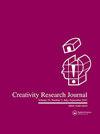The Evaluation and Selection of Creative Ideas in Educational Settings: Current Knowledge and Future Directions
IF 2.5
3区 心理学
Q2 PSYCHOLOGY, EDUCATIONAL
引用次数: 0
Abstract
Worldwide, student-centered pedagogies have emerged in education to develop creativity. However, these pedagogies do not automatically enhance students’ creativity, because students tend to underestimate and reject creative ideas – even when highly novel ideas are required to solve the problem at hand. Understanding how students evaluate and select ideas is crucial for enhancing creativity. Therefore, this paper reviews research on idea evaluation and idea selection among students. This paper suggests that the evaluation of ideas depends both on specific and general components, and a mild state of affect and openness to experience seems to play a significant role. To improve idea evaluation and idea selection, students should be exposed to a variety of ideas and effective instructional strategies benefit students as well. Teachers should explicitly instruct students to select creative ideas and encourage them to simultaneously generate and refine ideas. However, instructing students to transform their creative ideas into tangible products may unintentionally influence their choices for creative ideas. Balancing novelty and usefulness pose challenges for students during evaluation and selection, and teachers should attune to students’ reactions as much as possible (e.g. accommodating emotional outbursts). Finally, several future trends and important research questions are highlighted.教育环境中创意的评价与选择:当前知识与未来方向
在世界范围内,以学生为中心的教学法已经出现在教育中,以培养创造力。然而,这些教学方法并不能自动提高学生的创造力,因为学生往往会低估和拒绝创造性的想法——即使是在解决手头问题需要非常新颖的想法时。了解学生如何评价和选择想法对提高创造力至关重要。因此,本文对学生思想评价和思想选择的研究进行了综述。本文认为,对思想的评价既取决于具体成分,也取决于一般成分,温和的情感状态和对经验的开放性似乎起着重要作用。为了提高学生对创意的评价和选择,学生应该接触到各种各样的创意,有效的教学策略也应该让学生受益。教师应该明确地指导学生选择创造性的想法,并鼓励他们同时产生和完善想法。然而,指导学生将他们的创意转化为有形的产品可能会无意中影响他们对创意的选择。在评估和选择过程中,平衡新颖性和实用性给学生带来了挑战,教师应尽可能地适应学生的反应(例如,适应情绪爆发)。最后,指出了未来的发展趋势和重要的研究问题。
本文章由计算机程序翻译,如有差异,请以英文原文为准。
求助全文
约1分钟内获得全文
求助全文
来源期刊

Creativity Research Journal
Multiple-
CiteScore
5.10
自引率
7.70%
发文量
52
期刊介绍:
Creativity Research Journal publishes high-quality, scholarly research capturing the full range of approaches to the study of creativity--behavioral, clinical, cognitive, crosscultural, developmental, educational, genetic, organizational, psychoanalytic, psychometrics, and social. Interdisciplinary research is also published, as is research within specific domains (e.g., art, science) and research on critical issues (e.g., aesthetics, genius, imagery, imagination, incubation, insight, intuition, metaphor, play, problem finding and solving). Integrative literature reviews and theoretical pieces that appreciate empirical work are extremely welcome, but purely speculative articles are not published. Readers are encouraged to send commentaries, comments, and evaluative book reviews.
 求助内容:
求助内容: 应助结果提醒方式:
应助结果提醒方式:


